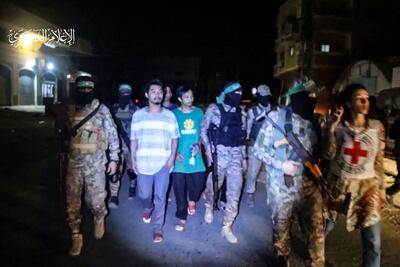Live updates: Follow the latest news on Israel-Gaza
The first exchange of hostages and Palestinian detainees between Hamas and Israel was completed on Friday and Saturday, part of an agreement during a temporary, four-day truce under which 50 hostages will be freed and 150 Palestinians released from Israeli jails.
So far, the truce accompanying the deal has not been broken, with 41 people held in Gaza – including 14 Thai hostages and one Filipino – freed by Hamas, and 78 Palestinians released by the Israelis.
A third stage of the deal – out of a total of four transfers – was under way on Sunday, when the Israeli government said it had received a list of names for the next batch of hostages.

The first transfers were welcomed by US President Joe Biden on Friday but he offered mixed messages at a press briefing, saying that while Israel’s goal of destroying Hamas was “legitimate”, he hoped “the rest of the Arab world in the region is also putting pressure on all sides to slow this down to bring this to an end as quickly as we can”.
Those remarks could fuel speculation that pressure is growing on Israel to turn the four-day truce into a longer pause in fighting, amid increasing international anger at the massive Palestinian death toll, which has exceeded 14,000, and worsening conditions in Palestinian refugee camps in Gaza.
Israel has already published a list of about 300 Palestinian detainees, women and teenagers set for release, although 150 are on the initial list in this phase of the transfer.
But questions remain as to how durable the temporary truce will be, especially since Israel said it could be extended if more hostages are freed.
Hamas says Israel has fired on Palestinians trying to get back into Gaza city – many are reportedly trying to head back to check on their homes and belongings, after being told to flee south by the Israeli army last month.
The truce was therefore fragile and in its first two days, both Hamas and the Israelis threatened to resume fighting, claiming the enemy was not fulfilling the deal.
Hamas has, however, shifted from a demand last month that 6,000 Palestinians, or roughly the total held in Israeli jails, must be released by Israel in exchange for all hostages.
An ongoing issue is delays sending aid – while more than 500 lorries a day brought vital supplies to the Gaza Strip during the prewar blockade, fewer than 200 a day have been making it through Rafah, although estimates vary.
For most of the period since aid convoys began moving on October 21, that number has been far less, often a few dozen per day.
On Friday, 230 lorries were ready to cross but only 196 made it through, according to the Red Cross, while 185 of 200 ready to cross on Saturday made it through.
Hamas, meanwhile, said 350 lorries had crossed on Saturday, claiming this was fewer than agreed. The reason for the discrepancy was not clear.
The hostage deal is also seen as insufficient by many in Israel. Kibbutz Be’eri, from where all but one of the 13 hostages was released, published a community statement saying residents were pleased with the release so far but were angered that Hila Rotem, 13, was released without her mother, “violating” the deal.
The Thai government also says 20 more of its citizens are still being held, among about 200 others from a number of nations.
Will Gaza fighting resume?
Israeli military commanders have been adamant the truce will not result in a longer-term armistice, or the resumption of peace talks to end the war.
On Saturday, Admiral Daniel Hagari said the war “would not stop until Hamas has been dismantled”, after the army’s Chief of Staff Lieutenant-General Herzi Halevi told Israeli soldiers that "at the end of the operational pause, we will return promptly to our operations and offensive in Gaza”.
“We will return the hostages in any way, through the deal, or through the next stages of the war," he said.

